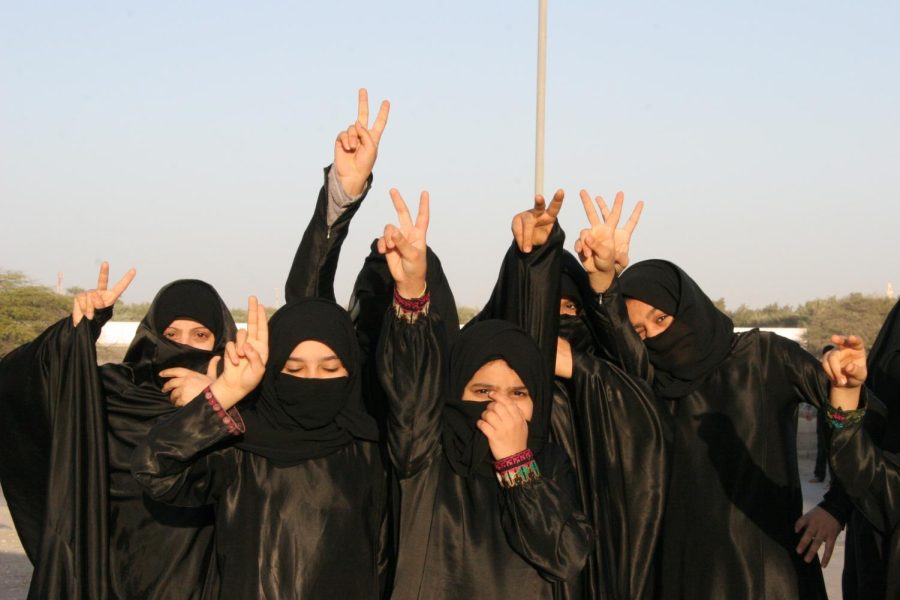Opinion | America is no longer safe for Shia Muslims
Photo courtesy of Al Jazeera's Sara Hassan/Flickr
Demonstrators at a protest in Bahrain on Feb. 13, 2011. Columnist Hamza Haq argues that the safety for Shia Muslims is in danger in America with recent anti-Shia violence happening in August 2022.
September 9, 2022
After 9/11, many American Muslims found themselves facing hostility and anger for the religion they followed. Hate crimes towards Muslims fueled by white nationalism continue to occur even 21 years after the attacks. But what if I told you the recent killings of four Muslim men in New Mexico was done by a Muslim himself?
It’s no question that in the past few decades, Shia Muslims have been victim to a myriad of attacks worldwide, most of which are often committed by self-proclaimed anti-Shia Muslims. The divide between Shia and Sunnis — the two major sects of Islam — goes back over 1,300 years, when a dispute occurred over the rightful successor to Prophet Muhammad. The consequences of this divide have been detrimental to Muslims of both sects and continue to affect them today.
The terrorist group ISIS sees Shias as apostates and has committed multiple mass killings of Shias over the past two decades. Just under a year ago, 72 Afghani Shias were brutally murdered in a suicide bombing orchestrated by ISIS.
ISIS is not the only extremist group committing atrocities toward Shias. In Pakistan, Deobandi militant groups like Lashkar-e-Jhangvi have been responsible for the murders of hundreds of Shias. This past March, 56 people were killed in another suicide bombing at the Peshawar Masjid Asna-e-Ashri, a Shia mosque.
The goal of these groups is not just to kill Shias, but to wipe out any sort of religious other. Along with Shias, Hindus and Christians have been victims of attacks, particularly in Balochistan. The Balochistan genocide, largely unaddressed by human rights organizations, involves the ongoing killings of the Hazara Shia community along with non-Sunni religious minorities in the region.
Get The Daily Illini in your inbox!
In response to these attacks, many Shias are fortunate to have found refuge in western countries like the U.S., but unfortunately, anti-Shia ideologies have caught up to them.
As Shia communities have continued to grow in America over the past few decades, Shias have been affected by sectarian violence and threats from extremists. All Shia mosques in Illinois were under threat when a man and two teenagers plotted to use explosives in a Shia mosque near Chicago. They claimed to have been inspired by ISIS, and search warrants led to the discovery of ISIS flags in their home.
Sectarian hate often takes forms other than man-to-man violence in the US. Instigation of anti-Shia violence has occurred in American universities. A Georgia State University Muslim Student Association member recorded and released a video of himself destroying turbahs/sajdagahs, which are an essential component of the Shia format of Islamic prayer.
The most recent and extreme form of anti-Shia violence in America happened just this past year when four Muslims were shot in the period between November 2021 and August 2022. Three of the men were Shia, while the fourth was allegedly mistaken for being Shia due to their last name. While it’s disputed if the motive of the murderer, a Sunni Muslim, was sectarian violence, the trend is clear — especially considering that Shias make up only 10-15% of Muslims in America.
It’s important to resist blaming this treatment of Shias on all Sunnis; rather, it is the work of extremists. Considering this, it is more important than ever for Sunnis and Shias to cooperate against sectarian violence and work together in a country where Islamophobia is still commonplace.
However, it is problematic that safe havens for Shia refugees in the west are starting to become dangerous as well, and the first step to ensuring the safety of Shias is to address that they are targets of extremism.
Hamza is a sophomore in LAS.







